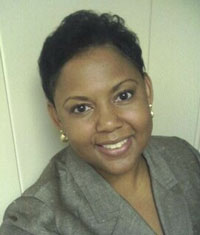 |
Linda Cunningham |
As UNMC’s first diversity specialist, Linda Cunningham leads campus diversity and cultural competency efforts in the human resources department.
Cunningham joined UNMC in 1998. Her educational background is in nursing and health care management. She has a master’s degree in public administration from the University of Nebraska at Omaha.
Cunningham was assistant director of UNMC’s Community Partnership for five years before she began work as a diversity specialist last November. She also was a past co-chair of the Employee Diversity Network, known as EDN.
“I’m passionate about diversity issues,” Cunningham said. “I am also committed to fulfilling the chancellor’s strategic plan initiatives for UNMC to become a culturally competent organization.”
Cunningham already is working toward that goal with the addition of cultural competency training as a part of new employee orientation.
During the session, she shares how experiences she gained as a spouse of a military member taught her the importance of cultural competency.
Cunningham was uprooted from her southern lifestyle in South Carolina and stationed in Turkey. She recalls a moment when she invited a new Turkish neighbor over for a southern specialty, sweet potato pie.
Because of cultural/religious restrictions, the woman was concerned about the ingredients used to make the pie. Cunningham, who knew only a few Turkish words, realized she needed to show her neighbor all of the ingredients, so she used hand signals and other gestures to indicate a few ingredients.
Cunningham said learning about other cultures, and what is important to people from different cultural backgrounds, can be invaluable within an organization. She said while race and ethnicity are important, it’s not the entire focus.
“It’s about culture, world viewpoints, gender, language and geographic differences and how people from those different experiences can work together by understanding and valuing other perspectives,” she said.
“It’s important in the world we live in, and the global environment that we’re going to live in, to be culturally competent,” said John Russell, assistant vice chancellor for human resources. “The best way to do that is to have a student body and a workforce that understands that.”
Russell said Cunningham brings unique experiences to the position.
“Linda is very familiar with the UNMC campus and its culture,” Russell said. “She also has a good relationship with the greater Omaha community and understands how the community relates to UNMC.”
In her role, Cunningham will work with faculty and staff to examine recruitment and hiring processes, retention, the value of diversity as a part of staffing within departments and employee satisfaction.
For the past four years, she has provided training and development in diversity and cultural competency to UNMC faculty, staff and students. She also participates in the professional development courses for the College of Pharmacy and the Monroe Meyer Institute where she educates students on cultural competency healthcare.
One way to accomplish UNMC’s diversity goals is to have diversity specialists represented in UNMC’s colleges.
“You have a department champion in the diversity specialist. It’s a more cohesive effort on campus,” Cunningham said.
Specialists in the College of Dentistry, Pharmacy, Nursing and Medicine will help reduce the duplication of efforts and coordinate diversity and cultural competency initiatives.
As for overall campus diversity and cultural competency, Russell said the human resources department has five key goals:
- Building a diverse workforce reflective of local population demographics;
- Increasing the retention rate of underrepresented minorities;
- Increasing the number of women and minorities in senior-level positions;
- Setting up a method of accountability and monitor campus progress; and
- Creating a culturally competent environment.
“You can recruit staff, but if they come and aren’t comfortable here . they won’t stay. So we want to work on our community,” Russell said.
“At the end of the day, it’s about embracing a variety of opinions, perspectives, backgrounds and values” Cunningham said. “In order for us to be the best, we need the best minds at the decision-making table.”